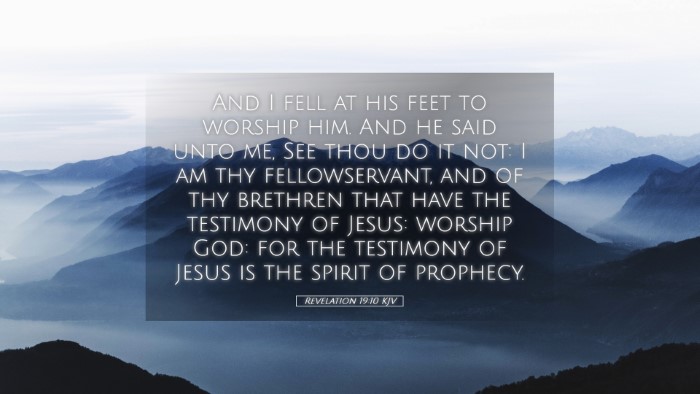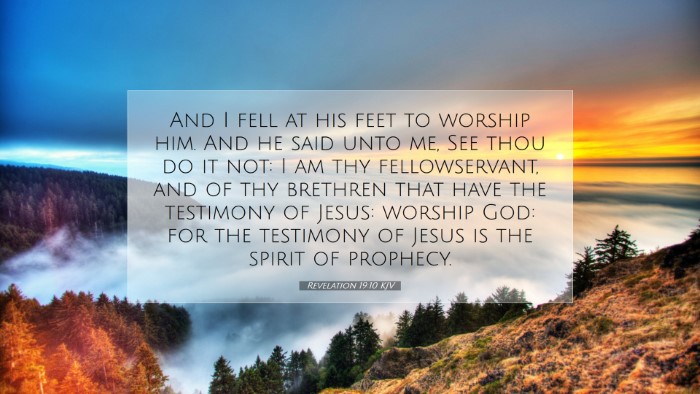Commentary on Revelation 19:10
Verse Text: "And I fell at his feet to worship him. But he said unto me, See thou do it not: I am thy fellow servant, and of thy brethren that have the testimony of Jesus: worship God: for the testimony of Jesus is the spirit of prophecy."
Introduction
The verse Revelation 19:10 serves as a significant reminder of the proper object of worship and the nature of prophetic testimony within the Christian faith. The scene depicts the Apostle John in a moment of awe, yet it is met with correction from the angelic being. The varied insights from public domain commentaries offer a deeper understanding of the implications of this passage.
Exegesis
Matthew Henry: Henry emphasizes the overwhelming nature of divine revelation as experienced by John. When confronted with the celestial being, John's instinct is to worship. However, the angel appropriately redirects John, asserting that he is not divine but rather a servant like John himself. This reflects a critical theological point about the hierarchy of beings—angels are not to be worshiped; only God is worthy of such reverence.
Adam Clarke: Clarke elaborates that this encounter illustrates the misplaced worship that can arise from encounters with the divine. He reinforces that the angel's correction signifies a foundational aspect of Christian theology—that all worship must be directed to God alone. Clarke also points out that the testimony of Jesus is central to the prophetic message, indicating that true prophecy must align with the life and works of Christ.
Albert Barnes: Barnes notes that the term "fellow servant" indicates a shared purpose between the angel and believers. Both serve in the unfolding of God’s plan, and both bear witness to the testimony of Jesus Christ. The angel underscores that it is through Christ that all prophecies gain significance, suggesting the unity of purpose in the heavenly and earthly realms.
Theological Implications
- Worship of God Alone: The swift correction given by the angel teaches that worship must always be reserved exclusively for God. This admonition serves as a timeless reminder to avoid idolatry, whether of physical representations or spiritual beings.
- The Nature of Prophecy: The verse defines the spirit of prophecy as the testimony of Jesus. This foundation indicates that any prophetic message must reflect Christ’s nature and mission. It prompts deep reflection on how messages conveyed in the name of prophecy should resonate with the core Gospel.
- Servanthood and Community: The identification of the angel as a "fellow servant" indicates a shared identity that transcends heavenly accolades. This aspect highlights the communal aspect of faith and service within the body of Christ.
Pastoral Applications
- Encouraging True Worship: Pastors are urged to teach congregations the importance of directing their worship towards God. This passage can be used to initiate discussions on the nature of worship and the importance of aligning one’s heart with God's commands.
- Understanding Prophetic Ministry: The relationship between Jesus and prophecy should be explored within the church, creating a solid foundation for understanding spiritual gifts and their applications today. This can aid in discerning genuine prophetic messages versus those that deviate from scriptural truths.
- Promoting Humility Among Leaders: This passage can cultivate an environment of humility among church leaders, reminding them that they are servants, accountable to God and not to elevate themselves above the congregants they serve.
Conclusion
Revelation 19:10 serves as a powerful reminder of the nature of worship and the essence of true prophecy. As believers navigate their spiritual journey, this verse encourages them to focus their devotion solely on God, recognize the centrality of Christ in all prophetic utterances, and embrace a spirit of servanthood that fosters true community among the people of God. The insights from Matthew Henry, Albert Barnes, and Adam Clarke collectively enrich our understanding and application of this pivotal verse.


